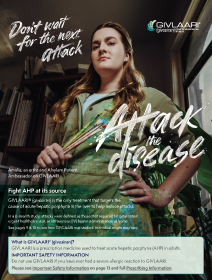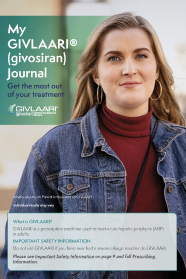Individual results may vary
"Having fewer attacks has helped
me live in the moment, and just
dream of what my life could be."
—Amalia, an artist and Alnylam Patient Ambassador on GIVLAARI

Individual results may vary
"Having fewer attacks has helped
me live in the moment, and just
dream of what my life could be."
—Amalia, an artist and Alnylam Patient Ambassador on GIVLAARI

Upcoming programs and events
Discover GIVLAARI® (givosiran): A Treatment for Adults with Acute Hepatic Porphyria (AHP)
Join us for Discover GIVLAARI, an educational event, presented by an Alnylam Patient Education Liaison (PEL), that will help you better understand AHP and how GIVLAARI may help. Learn about how patients prescribed GIVLAARI get started and hear from a patient who is taking GIVLAARI.
See options below for registration.

April 26th, 2025
Host/PEL & Patient: Lara Hervias & Donna
- 12:30 – 2:30 PM ET
- Saté (694 Town Center Drive, Newport News, VA 23606)
- Register Here

May 13th, 2025
Host/PEL & Patient: Kim Bischel & Hannah
- 6:00 – 8:00 PM CT
- Ruth's Chris Steak House (620 West Pinhook Road, Lafayette, LA 70503)
- Register Here
June 21st, 2025
Host/PEL & Patient: Kim Bischel & Hannah
- 12:00 – 2:00 PM ET
- Old Vinings Inn (3011 Paces Mill Road SE, Atlanta, GA 30339)
- Register Here
Stay informed with educational resources
There are a range of resources designed to help you navigate your treatment journey. Explore all the educational resources provided below.

Considering GIVLAARI® (givosiran)?
This brochure will help you learn more about GIVLAARI. If GIVLAARI seems like something that may help you, talk with your doctor about your treatment options.

Starting GIVLAARI
Now that you and your doctor have decided to start you on GIVLAARI, this guide may help you understand more about your treatment.

Talking to your doctor
This doctor discussion guide can help you better communicate to your doctor the impact AHP is having on your life. Fill it out and bring it to your next appointment.

Your GIVLAARI Journal
Keep track of how you’re feeling from month to month, injections, and side effects to discuss with your doctor
Frequently asked questions about GIVLAARI
There are probably a lot of things you want to know about GIVLAARI. Below you can find some answers to frequently asked questions. This information is not intended to replace discussions with your healthcare provider.
Choose a topic from one of the categories below, and click on it to get more information.
- GIVLAARI is a prescription medicine used to treat AHP in adults. There are 4 types of AHP:
- Acute intermittent porphyria (AIP)
- Variegate porphyria (VP)
- Hereditary coproporphyria (HCP)
- ALAD-deficiency porphyria (ADP)
- Most patients in GIVLAARI clinical studies had AIP, the most common type of AHP
GIVLAARI is given once a month as a subcutaneous injection (under the skin) by a healthcare professional.
GIVLAARI can cause injection site reactions.
Tell your doctor or nurse right away if you experience any of the following symptoms of an injection site reaction during treatment: redness, pain, itchiness, rash, discoloration, or swelling around the injection site.
If you miss a dose, talk to your doctor about scheduling your next dose as soon as possible.
GIVLAARI can cause liver problems. Your doctor will check your liver function by doing blood tests:
- Before you start using GIVLAARI
- Once a month for the first 6 months of treatment
- And when they think it is needed
If these tests show abnormal results, your healthcare provider will decide whether to temporarily interrupt or stop treatment with GIVLAARI.
GIVLAARI can cause kidney problems. Your doctor will check how your kidneys are working while you are using GIVLAARI.
GIVLAARI may cause increased levels of homocysteine (a type of amino acid) in your blood. Your doctor will check your homocysteine levels before and during treatment by doing blood tests. If your levels are increased, your doctor may check your folate, vitamins B12 and B6, and tell you to take a vitamin B6 supplement.
In clinical studies of GIVLAARI, some people on GIVLAARI used hemin to treat AHP attacks. Use of GIVLAARI with regularly scheduled (prophylactic) hemin was not studied in clinical trials of GIVLAARI. Talk to your doctor if you have questions about your treatment plan.
GIVLAARI has not been studied in women who are pregnant. If you are pregnant or plan to become pregnant, it is important to discuss your treatment plan with your doctor.
Keeping a journal to track how you feel is a great way to see if there is progress over time. You can compare your notes from month to month to see any potential changes in your health.
Be sure to bring your journal with you to doctor appointments to remember any questions or share your experience.
Yes, GIVLAARI was studied in a 6-month study with a 30-month extension for a total of 36 months.
GIVLAARI is given as an injection under the skin (subcutaneous) by a healthcare professional. Depending on your doctor’s recommendations and your insurance plan, home administration by a nurse or other healthcare professional may be an option.
GIVLAARI can cause a severe allergic reaction.
Tell your doctor or nurse right away if you experience any of the following signs or symptoms during treatment:
- Swelling – mainly of the lips, tongue or throat which makes it difficult to swallow or breathe
- Breathing problems or wheezing
- Feeling dizzy or fainting
- Rash or hives
- Itching
If you have a severe allergic reaction, your doctor or nurse will stop GIVLAARI treatment right away and you may need to take other medicines to control the symptoms.
After you and your doctor decide to begin GIVLAARI and enroll in our patient support program, Alnylam Assist®, we can provide support in 3 key areas: understanding benefits, eligibility for financial assistance, and disease and product education.
Stay updated
Sign up for the latest news about GIVLAARI
All fields are required.